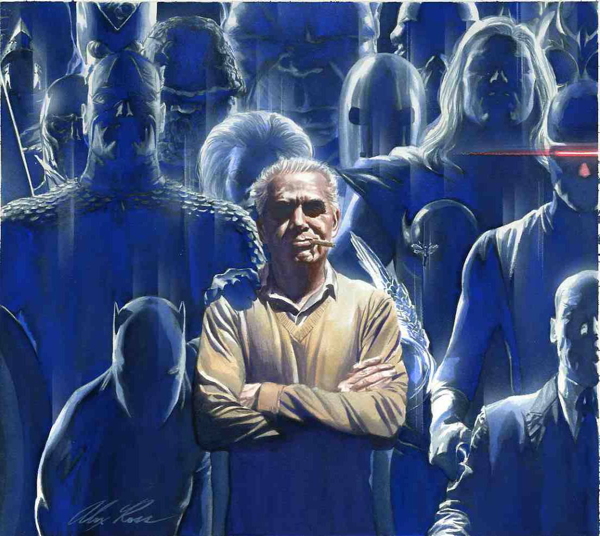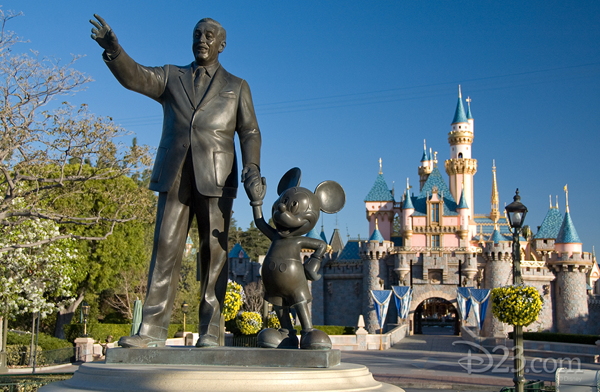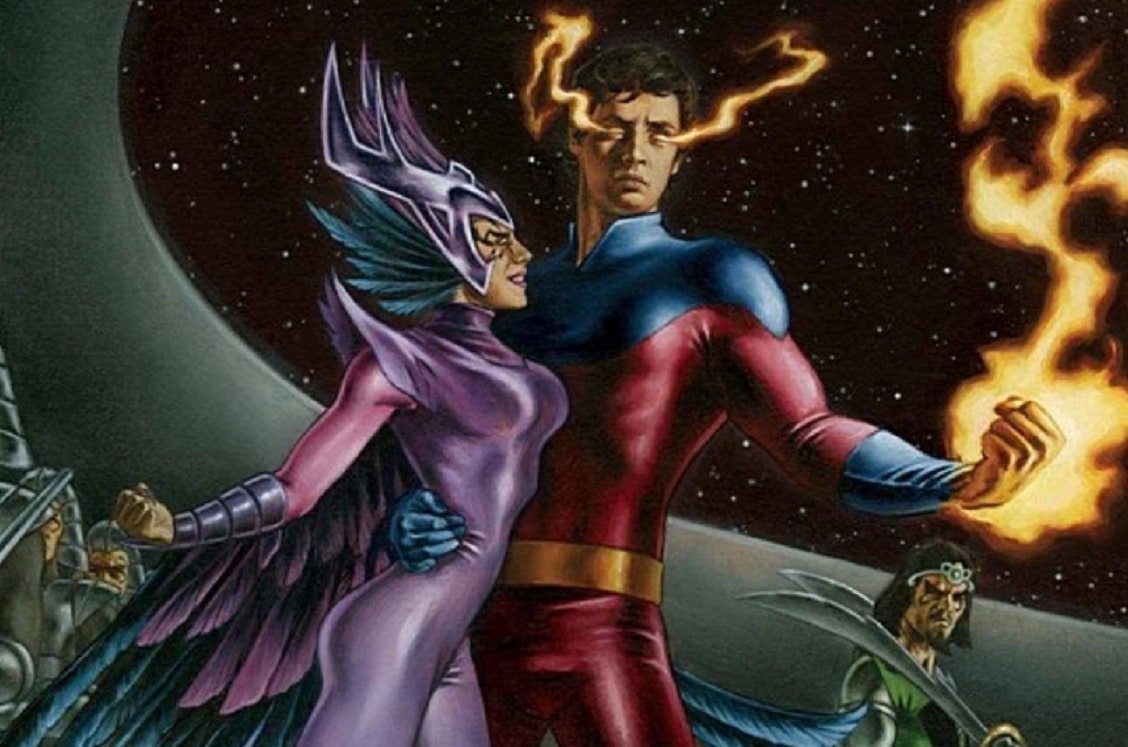
Friday’s announcement of a settlement between Jack Kirby’s heirs and Marvel seems like good news—but is it? And what does it mean?
I’m told Jeff Trexler, whose identification of the “instance and expense” aspect of the lawsuit may have helped get that into the petition to the Supremes, is writing his summary for TCJ.com, so while we all eagerly await that, here’s a little of the known knowns and known unknowns:
First off, Mark Evanier, a Kirby family confidant, a witness at various Kirby-related trials and filier of an amicus curiae brief is certainly in a position to know more of the Kirby position and this is all he had to say on the matter:
It was announced this morning that the family of Jack Kirby has settled with Marvel Comics (i.e., Disney) ending a very long dispute. The Supreme Court was only days from considering whether to take on the case and obviously, the timing of this settlement has much to do with both sides’ concern with what would get decided there.
If you’re coming to this page in search of details and commentary, you’ve come to the wrong place. I will be saying nothing about it other that I am real, real happy. And I’m sure Jack and his wife Roz, if they’re watching this from wherever they are, are real, real,real happy.
That’s either great fronting or a pretty solid indication that the Kirbys got what they were looking for. Since Evanier was intimately involved in the case, it’s probably legally all he can say. But if Mark thinks Jack is smiling, I’m smiling.
You can read all the petitions and briefs here. And you can bet a lot of people will be poring over these for a lot of reasons.
Charles Hatfield has a good round up of the ins and outs of the case itself, the many friend of the court briefs, and how the case grew in importance as more Hollywood vested interest signed on.
However, news of the cert petition reignited publicity over the case, and in May SCOTUS discussed the case in conference, after which the Court requested a response from Marvel. Then, in June, things started to happen: several important amici curiae briefs supporting the Kirbys’ petition brought high-profile attention to the case. One of these was filed on behalf of Kirby biographer Mark Evanier, Jack Kirby Collector publisher and editor John Morrow, and the PEN Center USA (a nonprofit representing diverse writers).
In addition, the California Society of Entertainment Lawyers filed a brief. Another brief that became very important for the press coverage of the case was submitted by Bruce Lehman, former Assistant Secretary of Commerce and Director of the US Patent and Trademark Office, and an authority on intellectual property law. Lehman filed in collaboration with former US register of copyrights Ralph Oman, the Artists Rights Society, and the International Intellectual Property Institute; they were joined by the American Society of Illustrators, the National Cartoonists Society, the Association of American Editorial Cartoonists, and other organizations representing arts professionals—as well as scores of cartoonists and illustrators who also signed on.
Kurt Busiek has been debunking some common myths about the case in the Beat’s own comments, but perhaps because Beat commenters are just smarter or less pig-headed than the average commenter, he saved his masterpiece in the genre for this CBR thread where he debunks from all times that the Kirby heirs were just greedy and opportunistic. (Link via Tom Spurgeon) He also speculates about the outcome, just like I’m gonna do in a few paragraphs:
Based on that, it sure doesn’t look like Marvel’s throwing the Kirbys a few bucks to go away. If that’s what they wanted to do, they could have done that any time within the last few years. Whoever blinked, it was the side that had the most to lose if the case went to the Supreme Court and risked a ruling they didn’t like.
That wasn’t the Kirbys — they were already getting nothing, so the Supreme Court deciding against them wouldn’t hurt them any.
But Disney/Marvel has billions on the line. They don’t want to risk losing that. Not even with a pro-business Supreme Court likely to rule for them. Because they’re not sure the Court would rule for them. Not with a bunch of people on the other side who make IP contracts their life — including one of the guys who helped write the 1978 Copyright Law. If that guy is saying, “No, no, it doesn’t work that way,” there’s too much of a chance that the Court will listen.
So my prediction is: All the public changes you see coming out of this are going to be favorable to the Kirbys. Probably the first thing you see will be creator credits. And the family’s going to suddenly be financially secure, like their father/grandfather wanted them to be.
What the “greedy heirs” morons don’t get is that this was a case with very important principles set off by the Copyright Law of 1976 regarding what is work for hire. As Kevin Melrose reports of a Law.com article, many issues remains undecided by the settlement, and it’s entirely possible that these will crop up again and the Supreme Court may yet hear such a case:
The Kirby heirs insisted the artist was an independent contractor who worked from home, provided his own supplies and received no benefits. However, he Second Circuit, using its frequently criticized “instance and expense” test, found that because Marvel assigned and approved projects and paid a page rate, Kirby’s contributions were indeed “for hire.”
The Kirbys took aim at the Second Circuit’s definition of work for hire in their petition to the U.S. Supreme Court, which drew support from the likes of Hollywood guilds and a former director of the U.S. Patent and Trademark Office, demonstrating the potentially far-reaching ramifications of the dispute. However, the 11th-hour settlement announcement arrived just ahead of a Supreme Court conference on Monday to determine whether to review the case — meaning the Second Circuit’s finding stands.
So the gray area surrounding work for hire before 1978 remains, although experts say given that 56-year window — or 35 years for copyrights transferred after 1979 — it’s only a matter time before another case, more likely to involve a musician/songwriter than a comics artist, makes its way to the Supreme Court, requiring the justices to weigh in.
As Kirby family attorney Marc Toberoff told Law.com, “At some point there will be another case like this.”
While it seems unlikely from the outside that SCOTUS would ever have sided with the Kirby heirs, Marvel didn’t know, and a happy smiling settlement was vastly to everyone’s benefit. And more to the point, there’s no such thing as secret in entertainment any more. As Joshua Riviera writes for EW:
One of the great things about modern pop culture isn’t just the wealth of content available, but the interest it has spurred in the creators behind it. Showrunners, once an invisible position in the broadcast era, are now at the forefront of fans’ minds when obsessing over TV. Similarly, the public perception of filmmakers has slowly evolved from the days of the monolithic studio system to accommodate directors and screenwriters and cinematographers and composers and VFX teams and crew. Comics have come a long way from the 60s, which saw Jack Kirby slowly become frustrated with the business that grew and endures to this day thanks in large part to his labors—now many comics are sold based on the strength of the people making them. But the way comics creators are credited in other media based on their work is often lacking.
Yet, things have changed a lot from the days when Marv Wolfman was barred credits of Blade, setting off a lawsuit he eventually lost and the current spate of copyright battles. Nowadays, one imagines, Marv would be saluted at the Hall H panel and trotted around to talk shows. While it’s pretty clear that you need to lawyer up to get your share of whatever pie — mini or maxi — may exist, Marvel/Disney has become more sensitive to the bad publicity of the starving creator railing against the corporation as he rolls around in his ratty sleeping bag from his stately cardboard box on the street.
And now some speculation from me. Given the fair-enough-to-shut-them-up treatment of Jim Starlin and the family of Bill Mantlo over Guardians of the Galaxy, Disney and Marvel seem to be on a better path now. You can attribute that to the bad optics of the cardboard box creator, but I’m pretty sure most of the top brass at Marvel proper, including Dan Buckley, Joe Quesada and Axel Alonso, would wish to see creators fairly treated if it were within their powers. (The same was undoubtedly true of Paul Levitz and Jenette Kahn at DC.)
Given the huge, vocal and unending respect for the work of Jack Kirby by just about every creative type involved with all these “comic book movies,” I share the Busiek viewpoint that we’ll see more public inclusion of Kirby among the “Marvel founders.” Kirby always got acknowledgement in the credits of Marvel movies, but we could see more “created by” credits. Kirby could be inducted into the “Disney Legends” hall of fame type deal. Disney doesn’t do a ton to promote its actual creative people, but I’d expect to see Kirby enshrined as much as possible.
And now, here is my Torsten-like fantasy to end this. Maybe someday at Disneyland, as the Marvel character rides and characters and churros swirl, there could be a statue of Stan and Jack as they create the Marvel Universe as we first knew it. I’m not sure Jack would have really liked that, but the victors write history, and I’m pretty sure that Jack Kirby is a victor now.







“While it seems unlikely from the outside that SCOTUS would ever have sided with the Kirby heirs, Marvel didn’t know, and a happy smiling settlement was vastly to everyone’s benefit”
When you have an uncertain outcome and a large amount of money on the line, it becomes a game of probabilities. Let’s say Disney stood to lose $500 million if it lost this suit (I made up this number out of thin air). And let’s say they calculated that they had an 80% chance of winning the case before the Supreme court. To calculate the cost of the lawsuit to them before taking it to court, they would multiply the 80% x $0 for the Kirbys and add 20% x $500 million for the Kirbys. The expected loss would be $100 million. Given this, any settlement they could make less than $100 million is worth taking. Obviously Disney’s calculus was more complex, and I have no idea how much they calculated they would lose in a worst case scenario. But I would not be at all surprised if some company risk managers did a similar valuation using probabilities to come up with an acceptable settlement price.
The other aspect is just the bad publicity the case would bring if it was heard by the supreme court. “Could court case prevent Avengers 2 and 3?” would be attention getting headlines. Even if 95% of the people don’t care, the 5% that does and stops buying the Marvel Brand (Movie tickets, DVDs, Video Games, Merchandising, etc..) adds up, especially over time across multiple products. Marvel has something Pixar like special going on with their brand in the mainstream marketplace and I don’t think they want to tarnish it. So just going to the supreme court would cost them money, possibly lots. Losing would have cost them a whole lot more. Having this go to court was a lose or LOSE situation. The settlement was the better option.
It’s not only Starlin and Mantlo, Marvel has apparently been recently making deals with practically all creators whose characters have appeared in movies, from Kev Hopgood (for War Machine) to Steve Gan (for Star-Lord).
The news that Marvel had reached an agreement with the Kirby Estate as well came as a pleasant surprise (I hadn’t been expecting it at all), but it makes sense given the context and can now be seen as part of a larger and smarter long-term strategy.
“Marvel has apparently been recently making deals with practically all creators whose characters have appeared in movies, from Kev Hopgood (for War Machine) to Steve Gan (for Star-Lord).”
That is great news.
Mike
Better late than never, but it’s amazing that Disney didn’t invite the Kirbys in for a meeting the day that they announced that they bought Marvel. Very happy for the Kirby family and for what this will hopefully mean to future mainstream comics creators.
“Better late than never, but it’s amazing that Disney didn’t invite the Kirbys in for a meeting the day that they announced that they bought Marvel. ”
I’m quite sure no one at Disney even knew they EXISTED then. And even now, few people besides the lawyers working on the case must know that.
I remember the press conference they did that day (there was – and must still be – a sound file of it available on the web). There was exactly ONE question about the comics – and the standard, noncompromising answer they gave shows that they had no idea of what they were talking about.
I suspect Disney lawyers had to do a lot of digging through four(?) different corporate owners’ paperwork (if it exists) to figure out what Kirby had signed, as well as all of the other creators working for Marvel. Disney really could sponsor a law school, just like they sponsored CalArts. They are masters of copyright and trademark law.
They had to straddle the Copyright Act of 1976. What existed (or didn’t) before then? After? How much of Marvel’s IP was in jeopardy? So yeah, I’m sure they’re working backwards with creators to shore up any legal questions. This is the biggest. (Stan Lee settled a few years ago.)
DC dealt with this early, amid the bad publicity for the Superman movie. They give credit readily, they pay royalties, Go read Stephen Bissette’s facebook feed… he is like Busiek, but more passionate. Marvel… doesn’t credit anyone in the books, Claremont received very little for “Days of Future Past”. Will this change? Perhaps.
As for the future of lawsuits… My money is on the musicians. Warners just made a huge deal with Prince over his catalog… he owns the rights to everything now, and Warners gets an exclusive deal with Prince. 1978 + 35 years… Van Halen, Billy Joel, Dire Straights…
http://www.nytimes.com/2011/08/16/arts/music/springsteen-and-others-soon-eligible-to-recover-song-rights.html?pagewanted=all&_r=0
That will be a stronger case. Music fans follow the musicians, not the labels. Plus the record labels have made Billions on music sales (both recorded and in print).
As for the the fantasy…
Nope, not in Disneyland… no room. (Unless they bury the Toy Story parking lot and build on that land east of the convention center.)
Walt Disney World… yes, there are a few bits of real estate still left in Reedy Creek. (Most of it is swamp land, and slated for conservation.) Once the Universal license expires, or is purchased, or whatever, then you’ll see a Marvel Universe theme park, probably east of the speedway on World Drive (with a new monorail stop). Statues? Nah… unlikely. Maybe some “hidden Mickey” artwork with Stan and Jack creating the Marvel Universe.
But, yes, within five years, Disney will induct (induckt?) a large class of Marvel Legends, probably for the D23 expo in 2015.
There’s a statue of Walt Disney at Disneyland because he OWNED the company, its characters and its films. (Never mind that Ub Iwerks had as much to do with creating Mickey Mouse as Disney, if not more. It seems Disney came up with the basic idea for a cartoon mouse, and Iwerks did the “grunt” work of drawing and animating the early films, and giving Mickey a personality.)
Stan and Jack never owned Marvel or its characters. So don’t expect statues of them.
Its possible at least one top Disney exec was familiar with Kirby: CEO Bob Iger is the nephew of Jerry Iger, one of Kirby’s first employers. This may have given him the insight needed for Disney to pursue their current course of settling things with creators.
If it weren’t for Jack Kirby helping the reinvention of Marvel in 1961 there wouldn’t be a Marvel today. It would have gone the route of Charlton, ACG and others. Stan Lee is a braggart that likes to pretend he brought about the Marvel age by himself but anyone who has read his work without Jack Kirby knows that Jack was the creative force behind it. I don’t blame Stan for Jack’s bad treatment, but I do blame his relative Martin Goodman…Marvel’s publisher at the time.
This agreement still does no justice to what Kirby provided to Marvel.
Comments are closed.